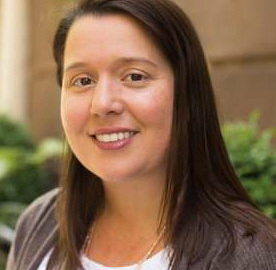
Anna Marandi always knew she wanted to create change, but it wasn’t until she found the Environmental Policy and Sustainability Management program at the Milano School of Policy, Management, and Environment that she was able to fully devote herself to social and environmental justice.
“I was burning out and knew it was time to change careers,” Marandi says. Prior to her time at The New School she worked in the entertainment industry as an associate producer at HBO. “I realized in order to devote myself to something social and environmental justice-related, I would need more education. Milano was a great starting point for this pivot, and I knew I’d eventually feel more fulfilled and empowered to create change in the world.”
While at Milano, Marandi made the most of her experience and said she “networked like crazy, went to every conference that was remotely interesting, took information interviews and invested a good deal of time and effort into meeting practitioners.” She participated in the International Field Program in Colombia where she worked on a community-based land management project serving low-income residents and co-authored a white paper for the Hudson River Foundation on innovative financing possibilities for large-scale restoration projects in the New York-New Jersey Harbor and Estuary. For her capstone project, she met with Michael Berkowitz, President of 100 Resilient Cities, to inquire about graduate research opportunities to address institutionalizing resilience at the local level.
“To be honest, I went into the project with zero clue as to what that would entail, but having (Interim Dean) John Clinton as my adviser was hugely critical to the success of my capstone,” she says. “I learned so much about the field of climate adaptation and urban resilience from that project, and I am ninety-nine percent sure I got my current job because of it.”
After graduating from Milano/The New School in 2016, Marandi became a Program Officer at the Institute for Sustainable Communities on their U.S. Program team where she supports the development of regional and local climate solutions. She currently works with partners in Washington State on their effort to expand the Puget Sound Climate Preparedness Collaborative, a consortium of local and tribal governments and regional agencies focused on enhancing regional resilience.



